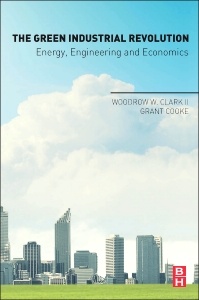Description
The Green Industrial Revolution
Energy, Engineering and Economics
Authors: Clark II Woodrow W., Cooke Grant
Language: English
Subjects for The Green Industrial Revolution:
110.33 €
In Print (Delivery period: 14 days).
Add to cart
Publication date: 12-2014
592 p. · 15x22.8 cm · Paperback
592 p. · 15x22.8 cm · Paperback
Description
/li>Contents
/li>Readership
/li>Biography
/li>Comment
/li>
The new green industrial revolution is driven by a variety of global environmental concerns. In some regions, it is spurred by the scarcity of cheap affordable renewable energy that will also lead to a reduced reliance on fossil fuel in the production of power. In others, it is driven by a need to reduce greenhouse gas (GHG) emissions from power generation. This book provides a comprehensive review of the most popular green ?disruptive technologies in energy production as well as their economic impact. In addition, the book includes a multitude of international case studies where these technologies are currently deployed and their economic impact on the region.
- The Endgame
- Industrial Development
- Big Oil’s Impact
- Coal, Natural Gas, and Nuclear Power
- Climate Change, Science and Technology, and Economics Are the Forces Behind the GIR
- Renewable Technologies
- Storage Technologies
- Smart, Green Grids
- Emerging Green Industrial Revolution Technologies
- China: The Twenty-First-Century Green Powerhouse
- The Green Industrial Revolution is Spreading Around the World
- Economics of the Green Industrial Revolution
- Smart Sustainable Communities: The Way We Will Live in the Future
- A Smart Green Future
Appendices 1-18
Environmental Engineers, Mechanical Engineers, Energy Engineers and Power Engineers
Woodrow W. Clark, II, MA3 , PhD, is an internationally recognized scholar and expert in economics, renewable energy, sustainability, and sustainable communities. He was a contributing scientist to the United Nations Intergovernmental Panel on Climate Change (UNIPCC), which as an organization was awarded the Nobel Peace Prize in December 2007 along with Al Gore and his film “An Inconvenient Truth."
Clark is an internationally recognized, respected expert, author, lecturer, public speaker and consultant on global and local solutions to climate change. His core focus is on economics for smart green communities. During the 1990s, he was Manager of Strategic Planning for Technology Transfer at Lawrence Livermore National Laboratory (LLNL) with University of California and U.S. Department of Energy. He was one of the contributing scientists for United Nations Intergovernmental Panel Climate Change (IPCC), awarded 2007 Nobel Peace Prize and Researcher for UN FCCC.
From 2000-2003, Clark was Advisor, Renewable Energy, Emerging Technologies & Finance to California Governor Gray Davis. After the “recall in 2004, Clark founded, and manages Clark Strategic Partners (CSP), a global environmental, policy and economics renewable energy consulting firm. Also 2015-2018, Clark taught courses at University of International Relations (UIR) in Beijing and lectured on “Environment Economics Cheung Kong Graduate School of Business (April 2017). He was appointed (July 2016) to be a member of the Editorial Board for the Energy Review Journal (ERJ) in China. He was selected to be a member of the UN B20 Finance Task Force supported in 2016 by China. Clark teaches and lectures in the EU, especially Denmark and Italy.
Clark published 12 books by the end of 2017 and over 70 peer-reviewed articles, which reflect his concern for global sustainable green communities. He has authored and edited books are The Next Economics (Springer, 2012) and Global Sustainable Communities Handbo
Clark is an internationally recognized, respected expert, author, lecturer, public speaker and consultant on global and local solutions to climate change. His core focus is on economics for smart green communities. During the 1990s, he was Manager of Strategic Planning for Technology Transfer at Lawrence Livermore National Laboratory (LLNL) with University of California and U.S. Department of Energy. He was one of the contributing scientists for United Nations Intergovernmental Panel Climate Change (IPCC), awarded 2007 Nobel Peace Prize and Researcher for UN FCCC.
From 2000-2003, Clark was Advisor, Renewable Energy, Emerging Technologies & Finance to California Governor Gray Davis. After the “recall in 2004, Clark founded, and manages Clark Strategic Partners (CSP), a global environmental, policy and economics renewable energy consulting firm. Also 2015-2018, Clark taught courses at University of International Relations (UIR) in Beijing and lectured on “Environment Economics Cheung Kong Graduate School of Business (April 2017). He was appointed (July 2016) to be a member of the Editorial Board for the Energy Review Journal (ERJ) in China. He was selected to be a member of the UN B20 Finance Task Force supported in 2016 by China. Clark teaches and lectures in the EU, especially Denmark and Italy.
Clark published 12 books by the end of 2017 and over 70 peer-reviewed articles, which reflect his concern for global sustainable green communities. He has authored and edited books are The Next Economics (Springer, 2012) and Global Sustainable Communities Handbo
- Clearly explains the scientific, engineering, technological, and economics driving the Green Revolution in power generation
- A guide to technologies such as renewable energy, smart green grids, and emission control technologies
- Packed with international case studies that provides real-world examples of how these technologies are currently being deployed around the world
- Explains the economic impact which these new technologies will play in building global sustainability
© 2024 LAVOISIER S.A.S.




